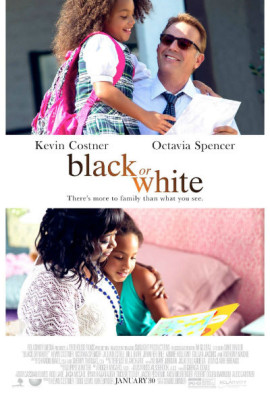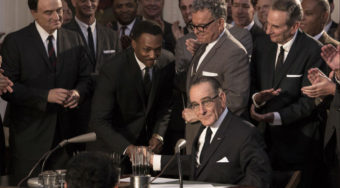Film Reviews

Black or White
Genre: Drama
Director: Mike Binder
Cast: Kevin Costner, Octavia Spencer, Jillian Estell, Bill Burr, Jennifer Ehle, André Holland, Gillian Jacobs, Anthony Mackie
MPAA-Rating: PG-13
Release Date: January 30th, 2015
In the endearing Mrs. Doubtfire (1993), viagra
a fight over custody was played for laughs with Robin Williams entertaining audiences with his wondrous sense of humor. Twelve years later, viagra
star (and financier) Kevin Costner has brought another custody battle to the big screen in the dramatic Black or White. Unlike the 1993 blockbuster though, this film is more interested in the more serious elements of a custody battle and how cultural heritage can play a major role in the fight.
The title of the new film refers to the custody bout between Elliot Anderson (Costner) and Rowena Jeffers (Octavia Spencer), two grandparents who want custody of their seven-year-old granddaughter, Eloise (Jillian Estell). Eloise is the child of Elliot’s daughter (who died during childbirth) and Rowena’s son Reggie (André Holland), a drug-addicted criminal who barely knows his own daughter. Elliot and his wife had been taking care of Eloise since birth but as the story begins, Elliott’s wife has passed away, leaving Elliot broken and alone.
Recognizing Elliott’s growing addiction to alcohol and his oftentimes-overt avoidance of her side of the family, Rowena petitions for custody of Eloise.
In the wake of racial tensions in the United States escalating over the past few months, it might seem that Black or White could strike a chord and help bring people together. The drama’s ambitions and ideals are notable enough. Costner, in fact, believed in the story so much that he financed much of it. He clearly wanted to make this movie and the earnestness of the endeavor shows.
As the custody battle grows intense, Elliot notes “This isn’t about black and white. This is about right and wrong.” Mike Binder, the writer and the director of the feature, certainly has his mind focused on what’s right and wrong here but too often, his answers are too simplistic and overshadowed by a script that leaves little room for a middle ground.
It’s unfortunate though because the cast is uniformly great. With strong supporting players like Mpho Koaha (as Eloise’s nerdy tutor) and Anthony Mackie (as Rowena’s tough-minded brother), there are enough strong performances here to tell a great story.
Costner also delivers a great performance as the over-bearing Elliott. Elliott crosses the line on a number of occasions (using an ugly racist word in one scene to get his point across) but he’s not driven by hatred. He’s driven by his love for his granddaughter, recognizing Reggie’s undeniable insufficiencies as a father— insufficiencies that Rowena painfully overlooks. Rowena is a strong character as well, who recognizes Elliott’s cultural insensitivity each time he ignores her side of the family.
Binder is too obvious in presenting his case though. Elliott’s alcoholism isn’t subtle— it’s comically obvious with one scene depicting him getting into the wrong vehicle when he’s leaving someone’s house. His mourning of his wife is written stereotypically, too, especially when she starts appearing to him as a vision.
Reggie, meanwhile, never really exists as a fully-developed character. (When Mackie’s character refers to him as “a perfect stereotype,” he’s not that far off.) There’s never any doubt that Reggie is a bad guy and when his police record is revealed, it only shows his insufficiencies as a parent.
When both sides have completed their arguments in court (where much of the story takes place), Binder steps on his own narrative, creating a corny ending that doesn’t really live up to the film’s potential.
There’s much to like about Black or White, including the ever-present talents of Costner and Spencer, two Oscar winners who bring great talent to the project. It’s even hard to fault the feature for its idealism or ambition. Its heart is in the right place but the script lacks subtlety, nuance and depth, leaving Black or White an uneven and safe drama that never even tries to say anything profound.
Review by: John Hanlon












